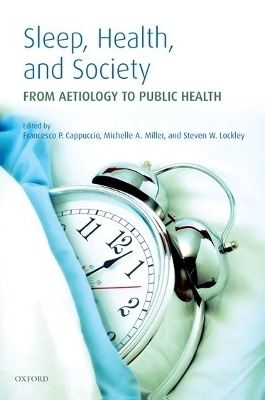
Sleep, Health and Society
Oxford University Press (Verlag)
978-0-19-956659-4 (ISBN)
- Titel ist leider vergriffen;
keine Neuauflage - Artikel merken
Sleep disturbances and sleep deprivation are common in modern society. Increasingly populations have been subjected to a steady constant decline in the number of hours devoted to sleep, due to changes in a variety of environmental and social conditions. Through the application of epidemiological methods of investigation sleep deprivation has been shown to be associated with a variety of chronic conditions and health outcomes, detectable across the entire lifespan,
from childhood to adulthood to older age.
Sleep medicine is rapidly being recognised as a growing area of clinical medicine, affecting wide-ranging specialists including respiratory physicians, neurologists, cardiologists and psychiatrists. However, it also has huge implications in the fields of epidemiology, public health, and preventive medicine.
This book summarises for the first time the epidemiological evidence linking sleep deprivation and disruption to several chronic conditions, and explores the public health implications with the view to developing preventive strategies. It will appeal to both preventive medicine specialists, sleep researchers, and clinicians involved in the various specialities that impact upon this growing field.
About the series
By looking at public health issues from a unique condition-based approach, the innovative From Aetiology to Public Health series examines top public health issues from aetiology through to public health and prevention.
Future titles in the series
Chronic Pain Epidemiology, edited by P Croft, F Blyth, and D van der Windt
Obesity Epidemiology, edited by D Crawford, R Jeffrey, K Ball, and J Brug
Respiratory Epidemiology, edited by J Jaakkola, M Jaakkola, G Viegi, and M Eisner
Professor Cappuccio is a cardiovascular physician, a clinical epidemiologist and a public health expert. After his medical degree in Naples, he moved to Britain where he trained at Charing Cross Hospital, St George's Hospital Medical School and the London School of Hygiene & Tropical Medicine in London. In 2000 he became Professor of Clinical Epidemiology & Primary Care at St George's, University of London and in 2005 he took up the newly established Cephalon Chair in Cardiovascular Medicine & Epidemiology at the University of Warwick where he set up the Sleep, Health & Society Programme. He is Director of the E.S.H. Centre of Excellence in Cardio-metabolic research, Head of the W.H.O. Collaborating Centre for Nutrition and Past-Treasurer and Member of the Executive Committee of the British Hypertension Society. He is Member of the Editorial Board of several international journals, including Sleep, and has published more than 350 papers, chapters and books. Michelle A Miller obtained her Bachelor of Science Degree in Medical Biochemistry from Royal Holloway College in 1986. After an initial position in Clinical Chemistry she took up medical research at Charing Cross Hospital in London. She moved to St George's Hospital Medical School in London in October 1989 and completed her part-time PhD in 1995. As the principal investigator on a British Heart Foundation project she developed her own independent research programme investigating cellular adhesion and oxidation in different ethnic groups. In 2004 she was awarded an Honorary Lectureship at St George's Hospital Medical School London and moved to take up a Senior Research Position at University College London investigating 'Genes, Society and Health'. Dr Miller has continued to work on the UCL- based Whitehall II Study and the English Longitudinal Study of Ageing (ELSA) following her departure in 2005 and currently holds an Honorary Senior Research Fellowship in the Epidemiology department at UCL. Steven W. Lockley obtained his Bachelors Degree (with Hons) in Biology from the University of Manchester in 1992 and a PhD in Biological Sciences from the University of Surrey in 1997. He has been studying basic and applied aspects of human circadian biology and sleep for more than 15 years and his research has been published in more than 50 original reports, chapters and proceedings. He has received a number of awards including fellowships from the Wellcome Trust and the Harvard Club of Australia Foundation, the Sleep Research Society Young Investigator Award, the Illuminating Engineering Society Taylor Technical Talent Award, the International Dark Sky Association Executive Director Special Award and, with the Harvard Work Hours Health and Safety Group, the National Sleep Foundation Healthy Sleep Community Award.
1. Sleep, health and society: the contribution of epidemiology ; 2. Principles of sleep physiology ; 3. Sleep deprivation and sleep disruption: risk factors and risk markers ; 4. Sleep and mortality ; 5. The epidemiology of sleep and cardiovascular risk and disease ; 6. Sleep and metabolic risk and disease ; 7. Sleep and respiratory disease ; 8. The epidemiology of sleep and depression ; 9. Sleep and neurological disorders ; 10. Sleep in children ; 11. Sleep, inflammation and disease ; 12. The genetics of sleep ; 13. The sociology of sleep ; 14. Psychosocial and medical consequences of misinterpreting sleep disturbance ; 15. Sleep and shift work ; 16. Sleepiness, alertness and performance ; 17. Effect of lack of sleep on medical errors ; 18. European working time directive and medical errors ; 19. A commentary on sleep education ; 20. Sleep, law and policy ; 21. Ethical considerations for the scheduling of work in continuous operations: physicians in training as a case study
| Reihe/Serie | Epidemiology: From Aetiology to Public Health |
|---|---|
| Zusatzinfo | 74 black and white line drawings |
| Verlagsort | Oxford |
| Sprache | englisch |
| Maße | 176 x 248 mm |
| Gewicht | 1000 g |
| Themenwelt | Medizin / Pharmazie ► Gesundheitswesen |
| Medizinische Fachgebiete ► Innere Medizin ► Pneumologie | |
| Studium ► Querschnittsbereiche ► Epidemiologie / Med. Biometrie | |
| Studium ► Querschnittsbereiche ► Prävention / Gesundheitsförderung | |
| ISBN-10 | 0-19-956659-3 / 0199566593 |
| ISBN-13 | 978-0-19-956659-4 / 9780199566594 |
| Zustand | Neuware |
| Haben Sie eine Frage zum Produkt? |
aus dem Bereich


